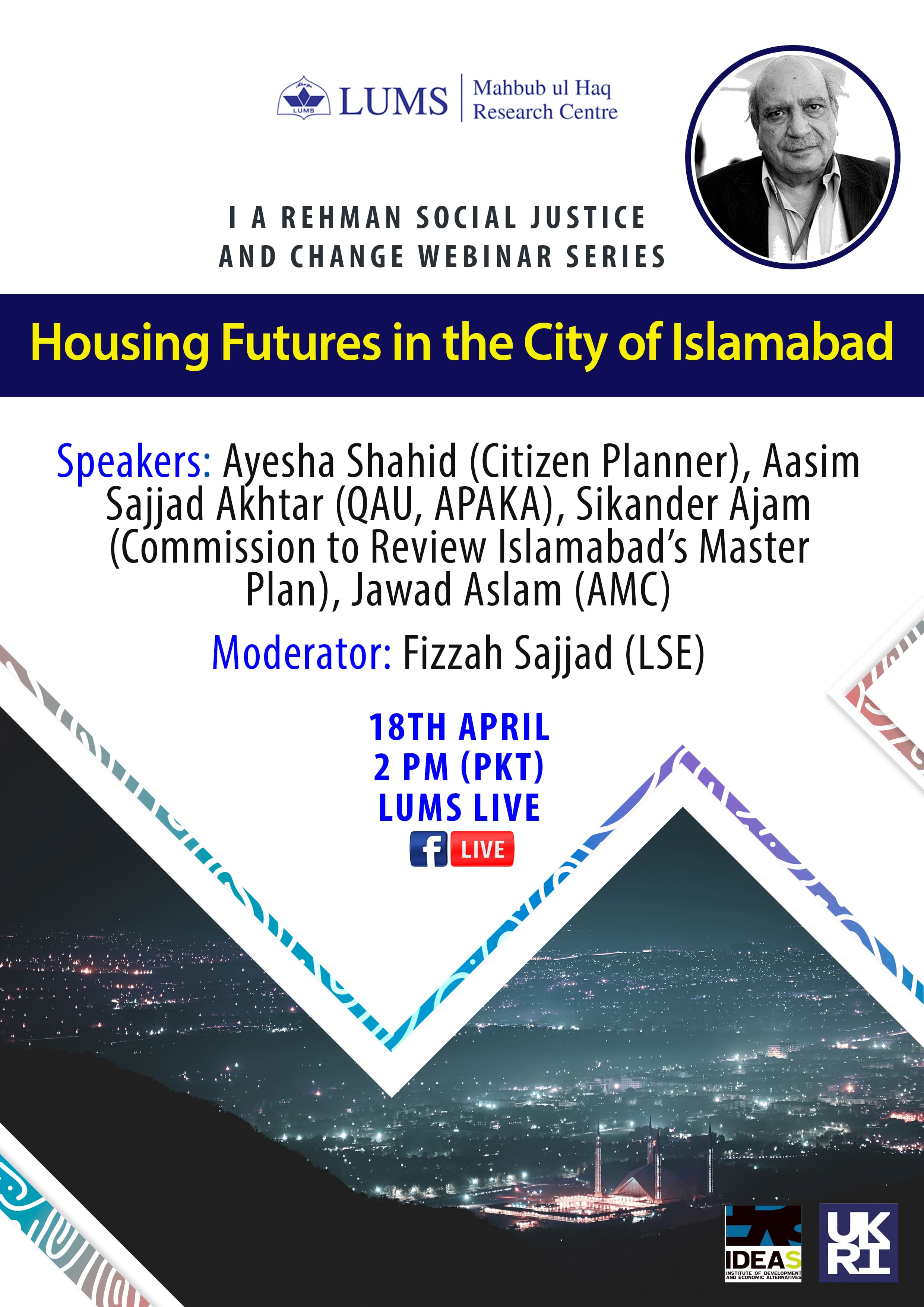Housing Futures in the City of Islamabad
There is general consensus that there is a dire need for improved and affordable housing options in the city of Islamabad. This session focuses on growing housing challenges, as well as policies and plans that are being developed to adequately meet housing needs, particularly in light of recent master planning revision exercises and the government’s attempts to support the construction of new units as per the Naya Pakistan Housing program.
The panelists are invited to share their understanding of existing challenges, the adequacy of current policies, and proposals for inclusive growth going forward, especially for katchi abadi residents and low-income households in the city. The panelists will also speak about long-term sustainability of current forms of urban development practices more broadly, and reflect on the means and mechanisms through which the government can protect and enhance access to dignified, adequate shelter.
Ayesha Shahid is a citizen planner and researcher with experience in the urban and rural sectors including mapping of katchi abadis, conducting different research projects in Karachi, Lahore and Rawalpindi, and implementing a Punjab wide governance related randomized control trial with the Department of Agriculture. As a self-identifying citizen planner, she is invested in understanding land development and transportation planning policies, predominantly in the cities of Rawalpindi and Islamabad. She hopes to develop a citizen vision for a just housing and transportation policy for the twin cities.
Aasim Sajjad Akhtar is Associate Professor of Political Economy at Quaid-i-Azam University in Islamabad, having previously taught at LUMS (2002-9). He is the author of numerous peer-reviewed journal articles and books. His newest book, entitled 'The Struggle for Hegemony in Pakistan: Fear, Desire and Revolutionary Horizons', is being published by Pluto Press in April 2022. Aasim has also been active with people's movements in Pakistan for over two decades, and is currently affiliated with the left-wing Awami Workers Party.
Sikandar Ajam Khan is a member of the Federal Commission for Review of the Islamabad 2022 Master Plan process. He set up and worked as principal of the Architectural and Industrial Design School at NUST. Sikandar holds a Masters of Architecture from Illinois Institute of Technology and a Masters of Town & Regional Planning from University of Wales. He has worked as an Architect, Urban Designer, and Town Planner for over four decades, winning a number of National design competitions, and securing honorable mention in two international design competitions.
Jawad Aslam is founder and CEO at Ansaar Management Company (AMC). AMC was launched in August 2008 with a vision to be a global leader in provision of high-quality, affordable housing. Aslam, also a Global Acumen Fellow, was raised in the US from where he attained his MBA. Later, he gained a degree in Arabic and Islamic Studies from Lahore. He has developed high end real-estate in the US, and upon his return to Pakistan, developed low-income housing with NGO Saiban on their project Khuda Ki Basti 4.
Fizzah Sajjad is a PhD candidate in Urban Studies at the London School of Economics and Political Science (LSE). She is an urban planner with nine years of research and project management experience. Her research interests focus on questions of land, housing, transport, and the politics of infrastructure development. She has worked on affordable housing development, gender equity in transport planning, and dispossession in rapidly urbanizing cities of the Global South. Fizzah holds a Masters in City Planning from MIT, and a Bachelors in Social Sciences from LUMS.

Mahbub ul Haq Research Centre at LUMS
Postal Address
LUMS
Sector U, DHA
Lahore Cantt, 54792, Pakistan
Office Hours
Mon. to Fri., 8:30 a.m. to 5:00 p.m.

